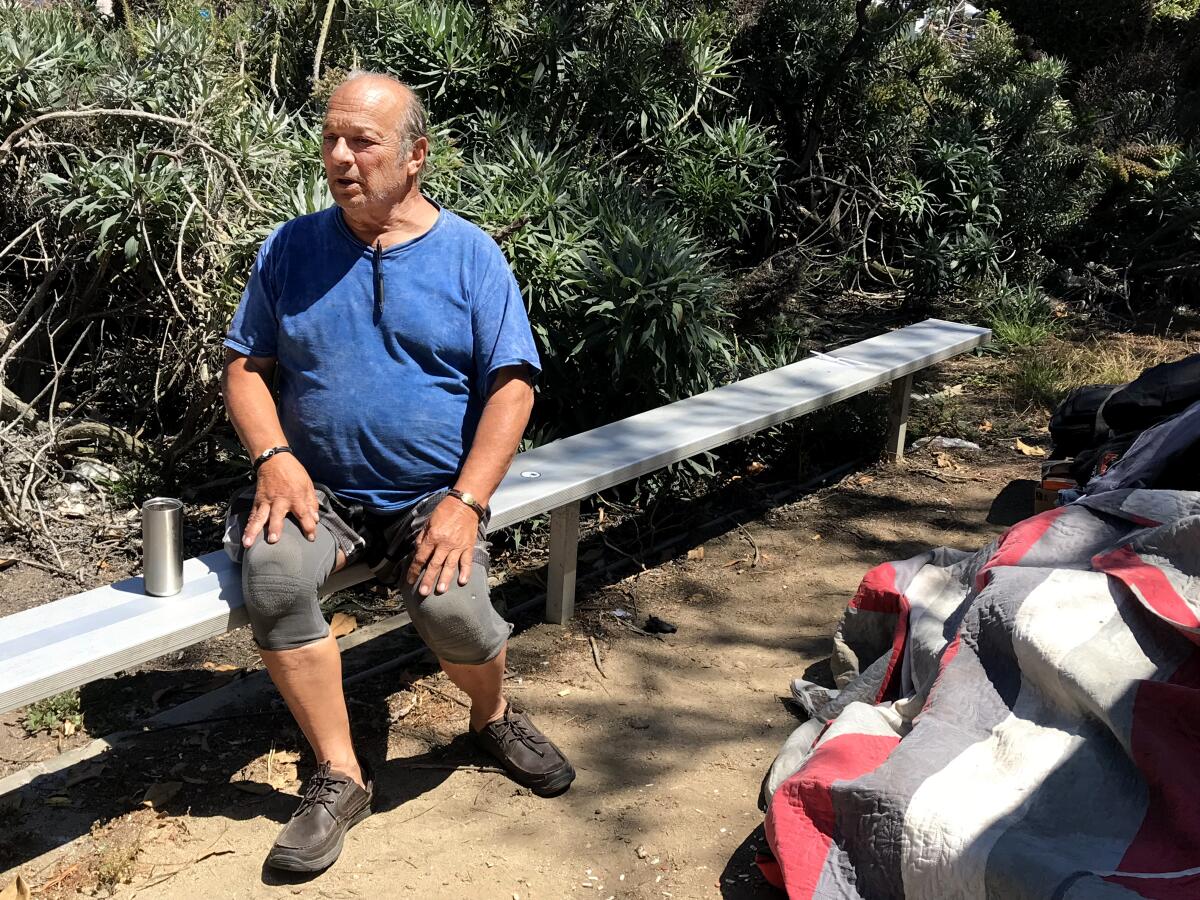Column: A staffer’s rash complaint about homelessness belies councilman’s stance

- Share via
Last week, L.A. Councilman Mike Bonin’s Westchester district director fired off an email to the city attorney’s office complaining about a homeless man on the premises.
On the hypocrisy scale, it wasn’t as bad as a governor dining at the French Laundry while urging people to stay home, but the note did not look good.
“We have a person permanently staying in front of our office who is both disruptive to our ability to work and blocks the entrance,” wrote Hannah Levien. “Would this be considered an interference with business trespass?”
Bonin, a principled but polarizing figure who is the subject of a recall campaign, has said repeatedly that criminalizing homelessness is antithetical to sound public policy and no way to solve such a complex problem.
During the pandemic, with Bonin’s full support, Los Angeles police did not cite illegal campers who erected dozens of tents along the Venice Boardwalk. The anti-social behavior on display, including rampant drug abuse and dealing, led some to dub one of the state’s most important tourist destinations “Methlehem.” The situation became hellish for everyone.
And then, just as Bonin and others were about to unveil a program to get the tents off the boardwalk by placing campers in shelters and hotel rooms, L.A. County Sheriff Alex Villanueva strode onto the boardwalk to announce that his homeless outreach team would be working to clear homeless encampments and that he might arrest homeless people if they did not leave the Ocean Front Walk by July 4.
“The sheriff’s rhetoric and approach are damaging, as is the criminalization of homelessness,” Bonin told my colleagues Doug Smith and Benjamin Oreskes. “It leads to re-traumatization, breaks crucial connections with service providers.”
Bonin had already been working on a plan — seemingly successful so far — to connect homeless people with social services and move them off the boardwalk into shelters or hotel rooms, paving a path (one hopes) to permanent housing.
On Tuesday, two days after Villanueva’s threatened deadline, a few dozen tents remained on the boardwalk and the homeless folks with whom I spoke said they’d been contacted repeatedly by outreach workers from St. Joseph Center, who are placing residents in housing.
All this is good progress, but many Venice residents are still fuming about what they perceive as Bonin’s sluggish response to the crisis. His staffer’s email served as a bit of gasoline on their already burning rage. Fox 11 reporter Gina Silva went to Bonin’s field office and found the homeless man in question.
He seemed taken aback when she read him Levien’s email, and moved his belongings away from the door.
After seeing the Fox 11 report, one of Bonin’s constituents, an anonymous Mar Vista resident, penned a letter to him that was reprinted by the Venice Current, and widely circulated.
How exactly, she asked, had the homeless man disturbed Bonin’s staffers?
“Did he push an unhoused woman up against the wall of the office and beat her mercilessly?” she asked. “Because that is something I witnessed right outside my home. ...
“Did he remove his pants and have explosive diarrhea all over the walls of your office? Because that happens all over my home and alley on a regular basis. ...
“Did you get a used heroin needle stuck in the side of your shoe as you walked to or from the office? Because that happened to my husband just last month.”
Bonin’s chief of staff replied via a statement to Fox 11, which read, in part, “Councilmember Bonin didn’t know about this and it isn’t how he personally would have handled it.”
In an emailed statement, Bonin called reaction to the leaked email a “toxic political stunt.”
On Tuesday, I spoke with Levien by phone. She told me she has been deeply committed to helping solve the homelessness crisis and has been doing outreach on the boardwalk and in Westchester Park. The reason she was concerned about the man in front of her office, she said hesitantly, was that he often slept without clothes, within view of her office, where she often worked late by herself.
::
On Monday afternoon, I drove over to Bonin’s Westchester office and found three men sitting in the shade of the portico near the entrance. One was the subject of Levien’s email to the city attorney. He told me to call him Jack Gold, though that was not his real name. He got kicked out of a Project Roomkey hotel room, he told me, because he left it for two days. Levien, who knows him by other names, is working to have him reevaluated for housing.
I sat down on the edge of a planter and spent an hour or so chatting with Gold and his neighbors Bill, 70, and T, 36, who did not want to give me their last names.
Gold, who has a sonorous voice, told me he used to work in Pasadena as a street performer. For some years, he said, he lived in a 1977 Ford Econoline van that he abandoned on the street when it reached 300,000 miles.
Occasionally losing his train of thought, he was both forthcoming and cagey about his family situation; he said he is estranged, but that reconciliation “is not out of the range of possibility.” He sat in a wheelchair because of bad knees, but can — and did — walk. His possessions are stashed next to a park sign. He doesn’t want to stay in a shelter or a hotel room in the middle of nowhere and does not want to follow strict rules about curfews and wake times.
Bill, who has a long gray beard and startling blue eyes, said he is a Westchester native and “degreed political economist” who has worked as car dealership service manager. He said he has lived in the park for 26 years.
T told me he grew up in Exposition Park and graduated from Morehouse College in 2006.
He wore a hospital band on his wrist, and his right eye was filled with blood. He said he had been jumped in Westchester Park by some guys trying to bring him down a peg.
I have no way of verifying what they told me, but they were polite and gracious, hardly a threat.
Levien told me that in retrospect, she regrets contacting the city attorney.
She wishes she had approached Gold, perhaps with a service provider in tow, and asked him for a little distance, “human being to human being.”
I bet if she had done that, he would have complied.
More to Read
A cure for the common opinion
Get thought-provoking perspectives with our weekly newsletter.
You may occasionally receive promotional content from the Los Angeles Times.











